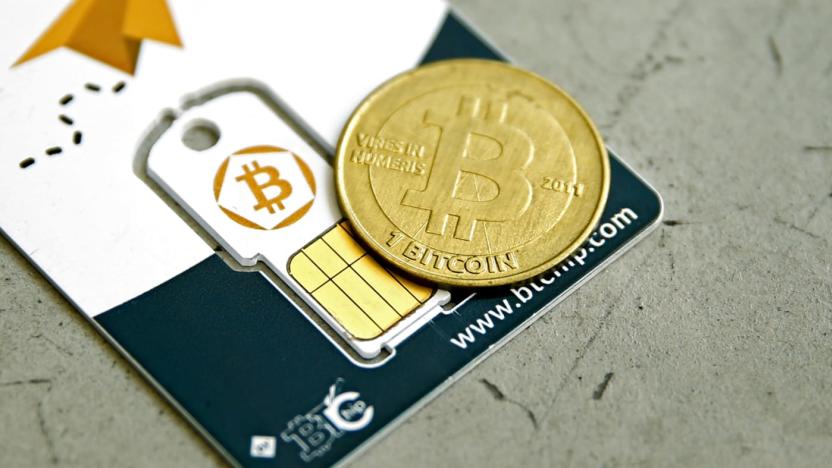cryptocurrency
Latest

Bitcoin wallets get a key approval in Switzerland
Bitcoin companies offering virtual wallets sometimes face a difficult legal question: do they have to operate as a bank (with all the regulation that entails), or can they function as something else? In Switzerland, at least, that matter is settled. Xapo has received "conditional approval" for running its bitcoin wallet service from the country. It'll have to participate in a self-regulatory organization and meet other unspecified terms, but it won't have to secure a banking license. As of now, it's classified as a financial go-between.

Bitcoin mining just became less rewarding, on purpose
If you have computers chugging away as bitcoin mining machines, don't be surprised if your output just fell through the floor. Reuters notes that code built into the digital currency system has cut the mining reward in half as of July 9th. Where there were previously 25 bitcoins (roughly $16,000) to be mined every 10 minutes, you now have to fight over 12.5. The measure automatically kicks in every four years as part of an attempt to curb inflation that would come from both a growing number of miners and ever-faster computers.

Cryptocurrency raider takes $60 million in digital cash
A cryptocurrency is only as reliable as the technology that keeps it running, and Ethereum is learning this the hard way. An attacker has taken an estimated $60 million in Ethereum's digital money (Ether) by exploiting vulnerabilities in the Decentralized Autonomous Organization, an investment collective. The raider took advantage of a "recursive call" flaw in the DAO's code-based smart contracts, which administer the funds, to scoop up Ether many times in a single pass.

Australia to auction off confiscated bitcoins this June
Australia has plans to sell off a considerable amount of bitcoins, the cryptocurrency favored by shady online folk, this June. 24,518 bitcoins confiscated by police will be auctioned off by financial services firm Ernst and Young in 2,000 blocks, an amount that equals just over a million US dollars given the current conversion rate. Australian authorities wouldn't specify where the bitcoins come from other than to say it was in conjunction with a crime. However, as the BBC points out, reports from 2013 indicate a similar quantity of bitcoins were seized in an online drug bust in Victoria. The upcoming auction will be open to bidders worldwide and could help set a precedent legalizing the currency for use in Australia, where it's still undergoing regulatory approval.

Bitcoin will pay for public services in a small Swiss town
Most experiments in paying with digital currencies have come from private companies, but the Swiss town of Zug is trying something different. As of July 1st, the community is launching a trial that will let you pay for public services using Bitcoin -- as long as you're shelling out the equivalent of 200 francs ($206 US) or less, you can skip old-fashioned money. The trial will run through the rest of 2016, though whether or not it lives beyond that depends on the town council's findings.

Craig Wright claims he is Bitcoin creator Satoshi Nakamoto
The search for Bitcoin creator "Satoshi Nakamoto" could be over, again. Almost two years since Newsweek erroneously doxxed a 64-year-old Japanese-American man living in California, the man himself has apparently come forward. So, who is he? According to a joint-investigation between the BBC, The Economist and GQ, the figure behind the cryptocurrency is Australian computer scientist Craig Steven Wright.

Go on a bitcoin spending spree in the next Steam sale
Both high-end gaming PCs and bitcoin mining rigs require an awful lot of power to operate at their best, so this next bit of news is a pretty natural fit: You can load your Steam wallet using Silk Road's favorite currency. Cryptocurrency payment processing outfit Bitpay says that Valve approached the company because the gaming juggernaut was looking for a way to process payments in emerging markets like Brazil, China and India. Meaning, countries where credit cards aren't easily accessible.

How a startup is making it easy to build virtual reality worlds
My most recent virtual reality experience was created by a 9-year-old. That's according to Martin Repetto, CEO of Voxelus, a platform that lets you build, share and play your own VR games. As I roam through this Minecraft-like world, steered by a Gear VR headset, Repetto tells me that a kid is the one who designed what I'm seeing. But for Voxelus, which launched last year at the Oculus Connect 2 conference, there's a clear goal: to let anyone, young or old, make VR games without a single line of code.

Microsoft no longer takes Bitcoins in its Windows app store (update)
Microsoft's grand experiment in accepting Bitcoins as payment hasn't panned out, it seems. The company has quietly updated its FAQ to reveal that it no longer accepts the digital currency in the Microsoft Store on Windows 10 devices. You can use an existing balance to buy your apps, but you can't supply more Bitcoins or get a refund. Like it or not, you'll have to use conventional money from now on.

Police target the man identified as 'Bitcoin creator'
Australian Federal Police raided the home and offices of Craig Steven Wright, the man named in Gizmodo and Wired reports as the possible mind behind Bitcoin. A dozen officials entered a home he was renting and offices registered to him, telling a Reuters reporter they were "clearing house." They also directed any questions to the Australian Tax Office, which has yet to comment. Wright has had previous run-ins with tax officials, and Wired reported that he may possess Bitcoins "easily worth a nine-figure fortune." However, the Guardian reports that the raids are unrelated to any possible role that Wright had in creating the crypto-currency.

This fitness tracking app pays you to walk more
Having a hard time motivating yourself to exercise? What if somebody offered to pay you work out? That's the idea behind Bitwalking -- an app, digital currency and marketplace that pays its users 1BW$ (Bitwalking dollar) for every 10,000 steps they take.

Microsoft wants to make Bitcoin easier for banks
Microsoft no longer solely counts on Windows 10 to pay the bills. With CEO Satya Nadella at the helm, it's also betting heavily on cloud services, and just revealed an interesting new one: Bitcoin-style encryption. Redmond joined forces with startup ConsenSys on a platform called Ethereum to help business to play around with the blockchain tech used in crypto-currency. The move is well-timed, as banks are starting to get seriously interested in BItcoin-style currency. However, Microsoft said that Bitcoin applications are "just scratching the surface of what can be done when you mix cryptographic security [with the] reliability of blockchain."

Rogue federal agent to serve 6.5 years for Silk Road scandal
Former federal agent Carl Force has been sentenced to six-and-a-half years in prison for his role in obstructing justice while investigating the online black market, Silk Road. As Reuters tells it, prosecutors were aiming for a longer sentence (87 months, or 7.25 years) but the defense was aiming for a brisk four-year sentence due to a history of mental health issues. To back up that claim, Force said he didn't understand a lot of what he was doing. Even the movie deal? Ars Technica reports that Force will have to pay $337,000 in restitution to a CoinMKT customer and $3,000 to an arrested Silk Road employee by the name of Curtis Green. If you'll remember, the last federal agent involved with the corruption charges, Shaun Bridges, is awaiting trial, while Silk Road's mastermind Ross "Dread Pirate Roberts" Ulbricht was given a life sentence for his crimes. [Image credit: Tim Arbaev for Getty]

US Marshals to auction last remaining Bitcoins seized from Silk Road
Here's your last chance to grab a chunk of those bitcoins authorities seized when they arrested Silk Road founder Ross Ulbricht. On November 5th, the US Marshals will be auctioning off 44,341 bitcoins -- around $10.7 million worth -- from 8AM to 2PM EST. The bitcoins will be sold in 21 chunks of 2,000 each, along with a single block containing 2,341 BTC. Note that you can't just show up during the online auction and bid: you need to fill out a bidder registration form and email it to the Marshals by November 2nd. The agency will then notify the winners on November 6th.

Winklevoss twins get approval to run their bitcoin exchange
After several months of waiting, the Winklevoss twins (they who claim to have invented Facebook) have the all-clear to run their Gemini bitcoin exchange. New York state's Department of Financial Services has granted a license to Gemini that lets it run as a chartered trust when it launches on October 8th. This doesn't make it a full-on bank, but it'll have the authority to accept deposits, make loans and serve as an agent for the government across 26 states and Washington, DC. All told, this takes bitcoin one step closer to legitimacy -- important when the virtual currency world still tends to be defined by scandals. [Image credit: Noam Galai/Getty Images for TechCrunch]

Bitcoin Ponzi scheme operator pleads guilty to fraud
Digital currencies like bitcoin are still marking many firsts, and that unfortunately includes the first crimes. Case in point: Trendon Shavers has pleaded guilty to the first-ever US securities fraud charges involving bitcoin. The Texan was accused of operating a Ponzi scheme that swiped more than $4.5 million from investors. He promised enormous returns on investment (a whopping 3,641 percent per year) to those who helped fund a stock market campaign, but was really using the money from newer customers to pay existing ones. To no one's surprise, this deception didn't last long. Nearly half (48) of the 100 investors suffered losses, and Shavers even used $147,000 of their funds to buy himself luxuries like a BMW M5 sedan.

US regulator accepts bitcoin as a commodity
Virtual currencies like bitcoin just came one step closer to legitimacy in the US. As part of its first action against an unregistered bitcoin options trading outfit, the Commodity Futures Trading Commission has determined that digital currencies are commodities subject to its regulations. The move both puts cryptocurrency on the same level as conventional commodity derivatives (like futures contracts or swaps) and rejects the notion that they're 'just' securities, like stocks. This isn't a shocking move when the CFTC had already hinted that it would rule this way, but it could mean a lot if it both gets bitcoin exchanges off the ground and reduces the potential for abuse. [Image credit: Thomas Trutschel/Photothek via Getty Images]

Former Mt. Gox CEO officially charged with embezzlement
Mt. Gox is a sordid story seemingly refuses to die. Last we heard, the bitcoin exchange's CEO Mark Karpeles had been arrested by Tokyo police, and some six weeks later he's been charged with pilfering 321 million yen (around $2.7 million) of former clients' money according to Reuters. Apparently he spent it on a custom-built bed and buying the rights for computer software development. Why the gap between arrest and now? Well, Japan grants that sort of holding even without formal charges. As the AFP Newswire tells it, Karpeles is still being held by Japanese authorities, but he can petition the court for "release pending trial." We'll have to wait and see if he exercises that right. [Image credit: Bloomberg via Getty Images]

Another Silk Road spy pleaded guilty to laundering bitcoins
$820,000. That's how much former Secret Service agent Shaun Bridges pilfered in bitcoin during his time investigating the online black market, Silk Road. Bridges pleaded guilty to money laundering and obstruction of justice recently and the Department of Justice says that it was analyzing the "block chain and data" from Silk Road's servers that lead the breadcrumb trail of ill-gotten gains back to him. Bridges funneled his 20,000 bitcoins, at that time worth $350,000, through a series of "complex transactions" with a stop at Mt. Gox before transferring them into US dollars in early 2013. It isn't nearly as flagrant as his colleague Carl Force's transgressions (a movie deal? Seriously?), but the amount of money Bridges tried stealing was an awful lot higher.

Former Mt. Gox CEO arrested in Japan over missing bitcoin
It's been months since Tokyo police revealed their belief that the Mt. Gox bitcoin heist was an inside job, and tonight they arrested its former CEO, Mark Karpeles. Some 650,000 bitcoin still remain unaccounted for since the exchange shut down in 2014, which Karpeles blamed on a computer flaw. According to the Wall Street Journal and The Japan News, police in Japan believe Karpeles manipulated the balances of the accounts using it to counter orders from customers and that some of the missing bitcoin may have never existed at all.








